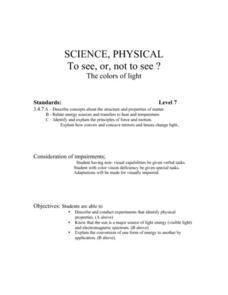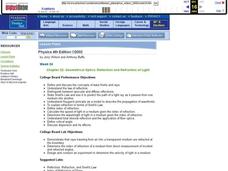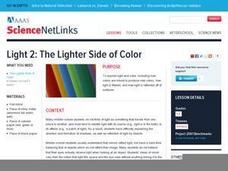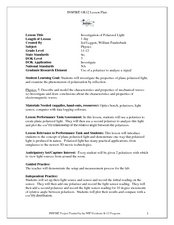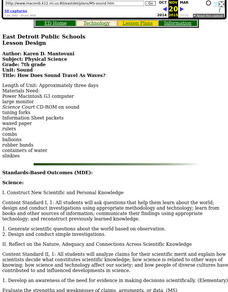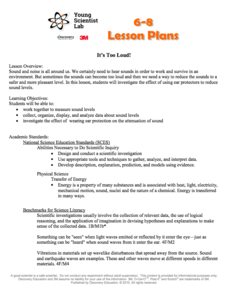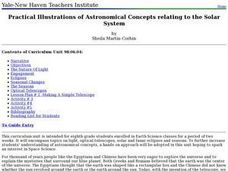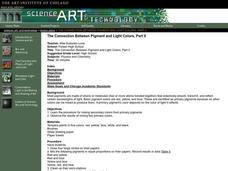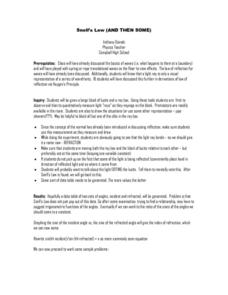Curated OER
Polarization
Eighth graders study the basic facts of polarization. In this light waves instructional activity students demonstrate some activities illustrating interference patterns.
Curated OER
From Vibration to Sound
Students observe a series of demonstrations to illustrate wave movement. In this sound wave instructional activity, students witness how objects create waves when dropped in a dish of water, use a rope and slinky to produce transverse...
Curated OER
To See or Not to See: The Colors of Light
Seventh graders describe and conduct an experiment that identifies the physical properties of light. They explore sources of visible light and an electromagnetic spectrum. Students explain the conversion of one form of energy to another.
Curated OER
Geometrical Optics: Reflection and Refraction of Light
Students define and discus the concepts of wave fronts and rays. In groups, they distinguish between specular and diffuse reflections and use Snell's Law to predict the path of light rays. They calculate the speed of light through...
Curated OER
Waves, Sound, and Light
Ninth graders explain waves in terms of energy transfer and describe their basic types and characteristics. They solve mathematical problems involving wavelength and frequency. Students conduct experiments in reflection and refraction.
Curated OER
The Lighter Side of Color
Young scholars explore light and color, including how colors are mixed to produce new colors, how light is filtered, and how light is reflected off of surfaces. They read materials provided, complete worksheets, and complete hands-on...
Curated OER
Aurora to Magnetosphere Global Exploration
In this magnetosphere global exploration worksheet, students read about the instrument on board a satellite launched by NASA called the Radio Plasma Imager. This imager detects echoes from plasma clouds. Students calculate the distance...
Curated OER
Radiation from Space
In this radiation worksheet, learners review the different types of radiation waves that come from space and the different telescopes used to detect this radiation. This worksheet has 17 true or false questions.
Curated OER
Frozen Film
Students discover how light reflects off surfaces. In this hands-on demonstration, students examine how variations in color are produced by light interference.
Curated OER
Physical Optics: The Wave Nature of Light
Students are introduced to the wave nature of light. In groups, they discuss Young's experiment and how diffraction and interference demonstrate the wave nature of light. Using examples, they show constructive and destructive...
Curated OER
Investigation of Polarized Light
Students investigate how polorizers filter light. For this physics lesson, students record their data and plot their results using a computer logging software. They discuss practical applications of polarization.
Curated OER
Super Gelatin
Students investigate the refraction properties of gelatin to calculate its index of refraction. They discover that as the light travels through the gelatin, its speed and wavelength also change. Students find th indes of refraction of an...
Curated OER
How Do Bats Navigate At Night?
Through an experiment, learners explore how bats use echolocation. First, they discuss how sound travels through air waves. Then, they talk about the ways bats navigate in the dark. As an extension, they can write about what they have...
Curated OER
Obtain a visible spectra of chlorophyll a
Students become familiar with the concept of spectroscopy or the study of the interaction of matter with electromagnetic radiation. They prepare solutions and measure absorbance at different wavelengths. Pupils comprehend that mater and...
Curated OER
Color
For this color worksheet, students read about light, prisms, the RGB model and the CMYK model. Students match colors with their definition, they draw the color chart, they apply the RGB and CMYK models to make colors and they interpret...
Curated OER
How Does Sound Travel As Waves?
Seventh graders participate in a number of activities designed to increase their understanding of how sound is generated and how it travels.
Discovery Education
It's Too Loud!
STEM scholars investigate sound attenuation by conducting an experiment in which they compare the farthest distance that they can hear a sound with and without ear protection.
Curated OER
Frozen Film
Students are introduced to the topic of light interference through this hands-on activity. They observe how light reflects off two surfaces and then meets to form an interesting variation of color on a film surface.
Curated OER
The Space Cadet's Laboratory: Using Electromagnetic Energy to Study Astronomy
Students build their own spectrophotometer to study light. In this physics lesson plan, students explain the dual nature of light. They calculate the angle of incidence and refraction using Snell's law equation.
Curated OER
Practical Illustrations of Astronomical Concepts Relating to the Solar System
Eighth graders are introduced to concepts related to the Solar System. In groups, they participate in an experiment in which they must describe a ray of light and how it travels. They draw a diagram of the electromagnetic spectrum and...
Curated OER
The Connection Between Pigment and Light Colors
High schoolers learn the procedure for mixing secondary colors from primary pigments and observe the results of mixing two primary colors.
Curated OER
Snell's Law (And Then Some)
Students conduct an experiment to test Snell's Law using a block of lucite and a ray box. They measure the light rays as they impinge upon the block. Students are also asked to draw the situation of the lab or create a model of the...
Curated OER
Starring...Bears!
Students illustrate a First Nations' legend. In this legend of bears instructional activity, students read several legends which involve bears and groups of stars or constellations. After reading, students illustrate portions of the...
Curated OER
Tessellation Design And Construction
Students study the basic elements and concepts of the visual art's perceptual component - such as shape, line and color. They create tessellations that foster problem solving and reflective thinking.




